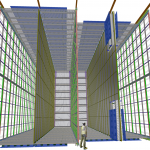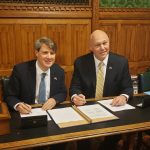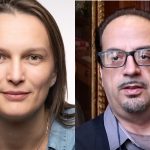The publication of the Technical Design Report is a major milestone for the construction of the Deep Underground Neutrino Experiment, an international mega-science project hosted by Fermilab. It lays out in great detail the scientific goals as well as the technical components of the gigantic particle detectors of the experiment.
Deep Underground Neutrino Experiment
From University of Colima’s El Comentario, Feb. 4, 2020: Alexis Solís Ceballos, estudiante de Ingeniería Química Metalúrgica en la Facultad de Ciencias Químicas de la Universidad de Colima, participó recientemente en una estancia de tres meses en el Fermi National Accelerator Laboratory (Fermilab) de Estados Unidos, donde un grupo de científicos de todo el mundo explora las altas energías para responder preguntas fundamentales que ayudarían a entender mejor cómo funciona el universo.
From Cambridge Network, Feb. 3, 2020: Representatives from UK Research and Innovation and the US Department of Energy have signed an agreement that outlines £65 million worth of contributions that UK research institutions and scientists will make to the international Deep Underground Neutrino Experiment and related projects hosted by Fermilab. DUNE will study the properties of mysterious particles called neutrinos, which could help explain more about how the universe works and why matter exists at all.
From UKRI, Jan. 23, 2020: Representatives from UK Research and Innovation and the U.S. Department of Energy have signed an agreement that outlines £65 million worth of contributions that UK research institutions and scientists will make to the international Deep Underground Neutrino Experiment and related projects hosted by Fermilab. DUNE will study the properties of mysterious particles called neutrinos, which could help explain more about how the universe works and why matter exists at all.
From STFC, Jan. 23, 2020: Representatives from UK Research and Innovation and the U.S. Department of Energy have signed an agreement that outlines £65 million worth of contributions that UK research institutions and scientists will make to the international Deep Underground Neutrino Experiment and related projects hosted by Fermilab. DUNE will study the properties of mysterious particles called neutrinos, which could help explain more about how the universe works and why matter exists at all.
Representatives from UK Research and Innovation and the U.S. Department of Energy signed an agreement that outlines £65 million worth of contributions that UK research institutions and scientists will make to the international Deep Underground Neutrino Experiment and related projects hosted by Fermilab.
From PBS Space Time, Jan. 6, 2020: Why is there something rather than nothing? The answer may be found in the weakest particle in the universe: the neutrino. In this 10-minute video, PBS Space Time host Matt O’Dowd and Fermilab scientist Don Lincoln explore the mysteries of the neutrino and how Fermilab is tackling them. The elusive neutrino may hold powerful secrets, from the unification of the forces of nature to the biggest question of all: Why is there something rather than nothing?
From Black Hills Pioneer, Dec. 13, 2019: Scientists at Fermilab and the Sanford Underground Research Facility in South Dakota are eager to begin collecting data from the Long-Baseline Neutrino Facility and the international Deep Underground Neutrino Experiment, which is hosted by Fermilab. But before the world’s largest neutrino experiment can begin producing results, more than 800,000 tons of rock will need to be removed from the 4,850-foot level of a former mine to make room for the detectors.
From UNICAMP, Dec. 19, 2019: Ana Amélia Machado e Ettore Segreto fazem parte da colaboração internacional Deep Underground Neutrino Experiment, sediada no Fermilab, e são responsáveis pelo detector de neutrinos chamado ARAPUCA., abreviação de Argon R&D Advanced Program Unicamp.
The American Physical Society Division of Particles and Fields has given its 2019 Early Career Instrumentation Award to two scientists on the international Deep Underground Neutrino Experiment, hosted by Fermilab. Ana Amelia Machado and Ettore Segreto, both of the University of Campinas in Brazil, are recognized for inventing and developing a photon sensor that is currently a baseline technology for the DUNE particle detector.



